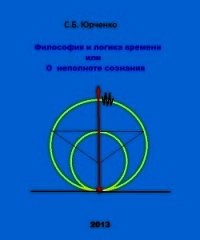Трудная проблема сознания - Васильев Вадим Валерьевич (читаем книги онлайн .txt) 📗
McGinn C. The Mysterious Flame: Conscious Minds in a Material World. N. Y., 1999.
McGinn C. The Making of a Philosopher: My Journey through Twentieth- Century Philosophy. N. Y., 2003 (2002).
McGinn C. Consciousness and Its Objects. N. Y., 2004.
McGinn C. Hard questions // Strawson G. et al. Consciousness and Its Place in Nature: Does Physicalism Entail Panpsychism? Charlottesville, 2006. P. 90–99.
McKinsey M. Refutation of qualia‑physicalism // Situating Semantics: Essays on the Philosophy of John Perry, ed. by M. O'Rourke and Corev Washington. Cambridge MA, 2007. P. 469–498.
McLaughlin B. P. Type epiphenomenalism, type dualism, and the causal priority of the physical // Philosophical Perspectives 3 (1989). P. 109–135.
Meixner U. New perspectives for a dualistic conception of mental causation // Journal of Consciousness Studies 15: 1 (2008). P. 17–38.
Melloni L. et al. Synchronization of neural activity across cortical areas correlates with conscious perception // The Journal of Neuroscience 27: 11 (2007). P. 2858–2865.
Menzies P. Counterfactual theories of causation: Entry in the Stanford Encyclopedia of Philosophy, 2001. http://plato. Stanford, edu/entries/causationcounterf actual.
Menzies P. The causal efficacy of mental states // Physicalism and Mental Causation: The Metaphysics of Mind and Action, ed. by S. Walter and H. — D. Heckmann. Exeter, 2003. P. 195–223.
Meyer M. The Present status of the problem of the relation between mind and body // The Journal of Philosophy, Psychology and Scientific Methods 9: 14(1912). P. 365–371.
Mills E. O. Giving up on the hard problem of consciousness // Explaining Consciousness — The "Hard Problem", ed. by J. Shear. Cambridge MA, 1997. P. 109115.
Mohrhoff U. Interactionism, energy conservation, and the violation of physical laws // Physics Essays 10: 4 (1997). P. 651–665.
Monk R. Ludwig Wittgenstein: The Duty of Genius. N. Y., 1991 (1990). Montero B. Varieties of causal closure // Physicalism and Mental Causation: The Metaphysics of Mind and Action, ed. by S. Walter and H. — D. Heckmann. Exeter,
2003. P. 173–187.
Montero B. What does the conservation of energy have to do with physicalism? // Dialectica 60: 4 (2006). P. 383–396.
Moore G. E. Some Main Problems of Philosophy. N. Y., 1962 (1953).
Moural J. The Chinese Room Argument // John Searle, ed. by B. Smith. Cambridge, 2003. P. 214–260.
Muijnck W. Dependencies, Connections, and Other Relations: A Theory of Mental Causation. Dordrecht, 2003.
Muijnck W. Two types of mental causation // Philosophical Explorations, 7:1 (2004). P. 21–35.
Nagel T. Brain bisection and the unity of consciousness // Synthese 22(1971). P. 396–413.
Nagel T. What is it like to be a bat? // Philosophical Review 83: 4 (1974). P. 435–450.
Nagel T. The View From Nowhere. N. Y., 1986.
Nagel T. Other Minds: Critical Essays. 1969–1994. N. Y., 1995.
Papineau D. Thinking about Consciousness. N. Y., 2004 (2002).
Parfit D. Personal identity // Personal Identity, ed. by J. Perry. Berkeley, 1975. P. 199–223.
26
5Parfit D. Reasons and Persons. N. Y., 1986 (1984).
Passingham R. E., Lau H. C, Free choice and the human brain // Does Consciousness Cause Behavior? Ed. by S. Pocketi, W. P. Banks and S. Gallagher. Cambridge MA, 2006. P. 53–72.
Patten M., Staudacher A., Walter S. Epiphenomenalism: Dead end or way out? // Journal of Consciousness Studies 13: 1–2 (2006). P. 7–19.
Pauen M. Was ist der Mensch? Die Entdeckung der Natur des Geistes. Mtinchen, 2007.
Pinker S. How the Mind Works. L., 1999(1997).
Pinker S. The Blank Slate: The Modern Denial of Human Nature. N. Y.,2002. Pinker S. So how does the mind work? // Mind & Language 20:1 (2005). P. 124.
Pinker S- The Stuff of Thought: Language as a Window into Human Nature. N. Y., 2007.
Place U. T. Is consciousness a brain process? // British Journal of Psychology 47 (1956). P. 44–50.
Place U. T. Token— versus type‑identity physicalism // Antropology and Philosophy 3: 2 (1999). P. 21–31.
Place U. T. Identity theories. TS 1999.
Place U. T. Identifying the Mind: Selected Papers of U. T. Place. N. Y., 2004. Polger T. Rethinking the evolution of consciousness // The Blackwell Companion to Consciousness, ed. by M, Velmans and S- Schneider. Maiden, 2007. P. 72–86.
Popper K., Eccles J. The Self and Its Brain: An Agrument for Interactionism. В., 1977.
Pratt J. B. The present status of the mind‑body problem // The Philosophical Review 45: 2 (1936). P. 144–166.
Preston A. Prolegomena to any future history of analytic philosophy // Metaphilosophy 35: 4 (2004).
Preston J., Bishop M. (eds) Views into the Chinese Room: New Essays on Searle and Artificial Intelligence. N. Y., 2002.
Priestley J. Disquisitions relating to Matter and Spirit. L., 1777.
Prinz J- The intermediate level theory of consciousness // The Blackwell Companion to Consciousness, ed. by M. Velmans and S. Schneider. Maiden, 2007. P. 247–260.
Putnam H. Minds and machines // Dimensions of Mind, ed. by S. Hook. N. Y., 1960. P. 148–180.
Putnam H. Psychological predicates // Art, Mind, and Religion, ed. by W. Capitan and D. Merrill. Pittsburgh, 1967. P. 37–48.
Putnam H. Words & Life. Cambridge MA, 1994.
Quine W. V. The Ways of Paradox. N. Y, 1966.
Quine W. V. Theories and Things. Cambridge MA, 1981.
Quine W. V. Pursuit of Truth. Cambridge MA, 1990.
Quine W, V. States of mind // The Nature of Mind, ed. by D. Rosenthal. N. Y., 1991. P. 287–288.
Ramachandran V. S., Hirstein W. Three laws of qualia: What neurology tells us about the biological functions of consciousness, qualia and the self // Journal of Consciousness Studies 4: 4–5 (1998). P. 429–457.
266
Ramachandran V. S. Mirror neurons and imitation learning as the driving force behind "the great leap forward" in human evolution // Edge (2000).
Ramachandran V. S. A Brief Tour of Human Consciousness: From Impostor Poodles to Purple Numbers. N. Y., 2004.
Reid T. The Works of Thomas Reid. 7 ed. Edinburgh, 1872.
Richardson- R. С The "scandal" of Cartesian interactionism // Mind 91(1982). P. 20–37.
Rieger J. W., Schichtanz S. "Wenn Du denkst, dass ich denke, dass Du denkst…" — Anmerkungen zur interdisziplinaren Auseinauderset‑zung uber das Bewusstsein // Bewusstseiu. Philosophie, Neurowissen‑schaften, Ethik, hrsg. v. С S. Hermann, M. Pauen, J. W. Rieger und S. Schicktanz. Paderborn, 2005. S. 22–52.
Rivas Т., Dongen H. v. Exit epiphenomenalism: The demolition of a refuge // JNLRMI 2:1 (2003).
Robb D., Hell J. Mental causation: Entry in the Stanford Encyclopedia of Philosophy, 2003. http://plato.stanford.edu/entries/meiital‑causation.
Robinson D. N. Consciousness and Mental Life. N. Y., 2008.
Robinson H. Dennett on the Knowledge argument // There's Something About Mary, ed. by P. Ludow, Y. Nagasawa, and D. Stoljar. Cambridge MA, 2004. P. 69–73.
Robinson W. S. The hardness of the hard problem // Explaining Consciousness
— The "Hard Problem", ed. by J. Shear. Cambridge MA, 1997. P. 149–161.
Robinson W. S. Epiphenomenalism: Entry in the Stanford Encyclopedia of Philosophy, 2007. http://plato.stanford.edu/entries/ epiphenomenalism.
Robinson W. S. Evolution and epiphenomenalism // Journal of Consciousness Studies 14: 11 (2007). P. 27–42.
Rosenberg G. H. Rethinking nature: A hard problem within the hard problem // Explaining Consciousness — The "Hard Problem", ed. by J. Shear. Cambridge MA, 1997. P. 287–300.
Rosenberg G. H. A Place for Consciousness: Probing the Deep Structure of the Natural World. N. Y., 2004.




